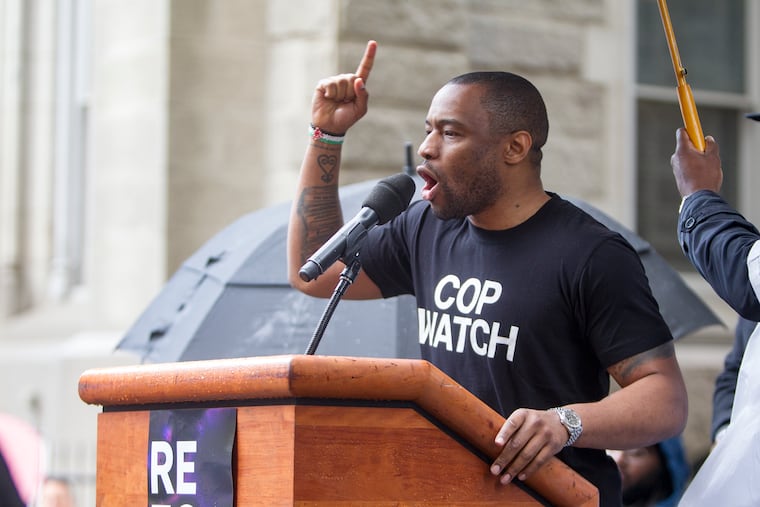Did Marc Lamont Hill commit a microaggression? | Opinion
What this incident says about campus free speech.

Let's imagine that Temple University professor Marc Lamont Hill's controversial comments on Israel last week took place in a college classroom, not at the United Nations. Let's further imagine that the college had a Bias Incident Response Team (BIRT), which allows students to submit anonymous complaints and empowers administrators to take action about them.
Would Jewish students have filed an objection to Hill's call for a "free Palestine from the river to the sea"? And what would the university have done after that?
It's anyone's guess. And that's precisely the problem with the increasingly popular BIRTs and the other efforts on campuses to fight bias and prejudice, including policies that bar or discourage "microaggressions." Bias is almost always in the eye of the beholder: one person's compelling argument will be another's gratuitous insult. And I don't want university administrators — or anyone else — telling us which is which.
>> READ MORE: Temple should take action after Marc Lamont Hill's Israel comments | Opinion
Consider the speech by Hill, who appeared before a U.N. panel called the Committee on the Exercise of the Inalienable Rights of the Palestinian People. Hill blasted restrictions on Palestinians' rights in Israeli courts and on their ability to travel. And he argued that violent resistance against Israeli authorities could be justified as self-defense.
He concluded with his "river to sea" remark, which some listeners interpreted as a call to wipe out Israel. The remark cost him his position as a commentator on CNN, which told him that his speech "didn't reflect their values," Hill said. Across social media, meanwhile, critics called on Temple to fire him as well.
Hill has tenure, which makes dismissing him a very hard thing to do. But board chairman Patrick O'Connor seemed eager to do just that, noting that if Hill worked for a private company he would be fired immediately. "No one at Temple is happy with his comments," O'Connor said. "Free speech is one thing. Hate speech is entirely different."
>> READ MORE: U.N. speech by Temple prof draws fire from university's board chair
Again, though, which is which? Hill's "river to sea" comment echoed the rhetoric of Hamas and some other groups that seek Israel's elimination, so I can understand why some people called the remark hateful. But I also take seriously Hill's claim that he was simply demanding freedom for everyone who lives within Israel's borders.
Most of all, I don't want university officials deciding the matter for us. More than 100 colleges and universities had established BIRTs by 2016, seeking to police offensive language and behavior. The University of Utah encouraged reporting incidents that involved "objectifying women"; Syracuse University's BIRT flagged "name calling"; and at the University of Oregon, tabooed comments included "I don't see skin color."
The last remark is often offered as an example of a microggression, a subtle or indirect statement that harms minority groups. Hundreds of colleges and universities have staged training around microggressions, which allegedly stigmatize minorities by underscoring their difference ("Asians are good at math") or erasing it ("America is a melting pot").
>> READ MORE: From Tel Aviv, Marc Lamont Hill's Palestine comments don't sound so wrong to me | Opinion
Again, I can imagine many circumstances in which listeners might be offended by such comments; depending on who is speaking, I might be offended myself. But I simply cannot understand how an educational institution can assume a unilateral position on a matter like the melting pot, which is one of the most contested concepts in American history. That's not education; it's indoctrination.
For his own part, Hill apologized for his choice of words, which he said had caused "confusion, anger, fear, and other sorts of harm." Likewise, Temple president Richard M. Englert acknowledged that Hill's comments had "sparked strong responses from those who were offended by his language" and that Hill's river-to-sea remark especially was seen by some as a "perceived threat."
But all meaningful speech offends or threatens someone. So we should leave it up to the involved parties to work things out, which is exactly what has happened in this case. Temple officials spoke about Hill's comments, as is their right, but no official body told him what he should or shouldn't say. Nor was he charged with violating a university policy about bias, microaggression, or any other form of speech.
And if you think these policies only target white racists, think again. The next time, the censors might be coming for Marc Lamont Hill. Or for you.
Jonathan Zimmerman teaches education and history at the University of Pennsylvania. He is the author of "Campus Politics: What Everyone Needs to Know" (Oxford University Press).